- Home
- Michelle Hodkin
The Unbecoming of Mara Dyer Page 11
The Unbecoming of Mara Dyer Read online
Page 11
I placed the picture carefully on my empty desk, put the box back into my closet and shut the door. When I noticed the silence, it stole the air from my lungs. I backed away from the closet and peered into the bathroom. The faucet was off. A single drop of water fell, sounding like a bomb in the stillness. The bathtub had overflowed, making the ceramic tile reflect the light like glass.
I didn’t remember turning the water off.
But I must have.
But there was still no way I was getting in.
I could barely breathe as I grabbed two towels and threw them on the floor. They darkened as they absorbed the water, and saturated in seconds. The water seeped through to my feet. The bathtub drain needed to be unplugged. I made my way over to it carefully, but everything inside me screamed bad idea. I leaned over the edge.
The emerald and diamond earrings glinted at the bottom. I raised my hands to my ears.
Yup, gone.
I heard my mother’s voice in my mind. “Don’t lose them, okay? They were my mother’s.”
I squeezed my eyes shut and tried to breathe. When I opened them, I would be brave.
I tested the water with my finger. Nothing happened.
Of course nothing happened. It was only a bathtub. The pictures had distracted me and I let it overflow, then turned it off without remembering it. Everything was fine. I plunged my arm in.
For a second, I could not think. It was as if all feeling beneath my elbow had been cut off. Like the rest of my arm never even existed.
Then the scalding pain clawed at my skin, my bones, inside out, outside in. A soundless scream misshaped my mouth and I struggled to pull my arm out but it wouldn’t move. I couldn’t move. I crumpled against the side of the bathtub. My mother found me there an hour later.
“How did you say it happened?” The ER doctor looked my age. He looped the gauze over the red, swollen skin of my forearm as I clenched my teeth, fighting off a scream.
“Bathtub,” I managed to croak. He and my mother exchanged a glance.
“Your arm must have been in there for some time,” he said, meeting my eyes. “These are some serious burns.”
What could I say? That I tested the water before reaching in and it didn’t seem that hot? That it felt like something grabbed me and held me under? I could see in the doctor’s eyes that he thought I was crazy—that I did it on purpose. Anything I could say to explain what happened wouldn’t help.
So I looked away.
I didn’t remember much about the ride to the hospital, except that Joseph and both of my parents were with me. And thankfully I didn’t remember my mother picking me up off the bathroom floor, or getting me in the car as she must have. I could barely look at her. When the doctor finished with my bandage, he pulled her into the hallway.
I focused on the searing pain in my arm to avoid thinking about where I was. The antiseptic smell invaded my nostrils, the hospital air leached into my skin. I clenched my jaw against the nausea and leaned against the window to feel the cool glass on my cheek.
My father must have been filling out paperwork, because Joseph sat and waited out there, all alone. He looked so small. And still. His eyes were downcast and his face—God. His face was so scared. A hard ache rose in my throat. I had a glimpse of how terrified he must have been when I was in the hospital the last time, seeing his big sister swallowed up in a hospital bed. And now here we were again, not even three months later. It was a relief when my mother finally returned to lead me out of the room. We were all silent on the ride home.
When we arrived back at the house, Daniel was there. He rounded on me when I walked in the door. “Mara, are you okay?”
I nodded. “Just a burn.”
“I want to talk to Mara for a bit, Daniel,” my mother said. “I’ll come to your room in a while.”
Her voice was a threat, but Daniel looked unperturbed, more worried about me than anything else.
My mother led the way down the hall to my bedroom and sat on my bed. I sat on my chair.
“I’m making an appointment for you to talk to someone tomorrow,” she said.
I nodded, as Joseph’s terrified face appeared in my mind’s eye. He was just a kid. I’d put him through enough. And between the burn, the mirrors, the laughter, the nightmares—maybe it was time to do things my mother’s way. Maybe talking to someone would help.
“The doctor said you must have held your arm under water for a long time to get second-degree burns. And you stayed there until I found you?” she asked, her voice raw. “What were you thinking, Mara?”
My voice was laced with defeat. “I was going to take a bath, but the earrings—” I took a shaky breath. “The earrings you lent me fell into the tub. I had to get them before I could unplug the drain.”
“Did you?” my mother asked.
I shook my head. “No.” My voice cracked.
My mother’s eyebrows knit together. She walked over to me and put her hand on my earlobe. I felt her finger unhook the back of an earring. She held the emerald and diamond stud in her flat palm. I lifted my hand to my other ear; that one was in too. I removed the earring and placed it in her hand as tears welled in my eyes.
I’d imagined the whole thing.
22
MARA DYER?” THE RECEPTIONIST CALLED OUT. I shot up. The magazine I’d been not-reading fell to the floor, open to an NC-17 photograph of two naked models straddling a handsomely suited actor. Rather racy for a psychiatrist’s office. I picked up the magazine and set it on the coffee table, then walked over to the door the smiling receptionist was pointing at. I went in.
The psychiatrist took off her glasses and set them on her desk as she rose. “Mara, it’s nice to meet you. I’m Rebecca Maillard.”
We shook hands. I stared at the seating options. An armchair. The obligatory couch. A desk chair. Probably some kind of test. I chose the armchair.
Dr. Maillard smiled and crossed her legs. She was thin. My mother’s age. Maybe they even knew each other. “So, what brings you here today, Mara?” she asked.
I held out my bandaged arm. Dr. Maillard raised her eyebrows, waiting for me to speak. So I did.
“I burned myself.”
“Do you mean, you were burned, or you burned yourself?”
She was quick, this one. “I was burned, but my mother thinks I burned myself.”
“How did it happen?”
I took a deep breath and told her about the earrings and the bathtub. But not the unlocked front door. Or the box in my closet that I didn’t remember taking down. One thing at a time.
“Has anything like that happened before?”
“Like what?” I scanned the books on her shelves; the diagnostic manual, pharmacological volumes, journals. Nothing interesting or unusual. It could have been anyone’s office. There was no personality.
Dr. Maillard paused before answering. “Was last night the first time you’ve been in the hospital?”
I narrowed my eyes at her. She sounded more like a lawyer than a psychiatrist. “Why ask if you already know the answer?”
“I don’t already know the answer,” Dr. Maillard said, unruffled.
“My mother didn’t tell you?”
“She told me that you moved here recently because you experienced a trauma back in Rhode Island, but I didn’t get a chance to speak with her for very long. I had to switch one of my other patients to see you on such short notice.”
“I’m sorry,” I said.
Dr. Maillard furrowed her eyebrows. “There’s nothing to be sorry for, Mara. I just hope I can help.”
I hoped so too, but I was starting to doubt it. “What do you have in mind?”
“Well, you can start by telling me if you’ve ever been in the hospital before,” she said, clasping her hands in her lap. I nodded.
“What for?” She looked at me with only casual interest. She wrote nothing down.
“My friends died in an accident. My best friend. I was there, but I wasn’t hurt.”
She looked c
onfused. “Why were you in the hospital, then?”
“I was unconscious for three days.” My mouth didn’t seem to want to form the word “coma.”
“Your friends,” she said slowly. “How did they die?”
I tried to answer her, to repeat what my mother had told me, but had trouble with the words. They were buried in my throat, just beyond my reach. The silence grew more and more awkward as I struggled to pull them out.
Dr. Maillard leaned in. “It’s okay, Mara,” she said. “You don’t have to tell me.”
I took a deep breath. “I don’t remember how they died, honestly.”
She nodded her head. A strand of dark blond hair fell over her forehead. “Okay.”
“Okay?” I shot her a skeptical look. “Just like that?”
Dr. Maillard smiled softly, her brown eyes kind. “Just like that. We don’t have to talk about anything you don’t want to talk about in this room.”
I bristled a bit. “I don’t mind talking about it. I just don’t remember.”
“And that’s okay. Sometimes, the mind has a way of protecting us from things until we’re ready to deal with them.”
Her assumption bothered me, more than it should have. “I feel ready to deal with it.”
She tucked her hair behind her ear. “That’s fine too. When did all of this happen?”
I thought for a minute—it was so hard to keep track of time. “A few months ago? December?”
For the first time, Dr. Maillard’s demeanor changed. She seemed surprised. “That’s pretty recent.”
I shrugged and looked away. My eyes fell on a plastic-looking plant in the corner of the room that had caught the sunlight. I wondered if it was real.
“So how have you been doing since the move?”
A slight smile twitched at the corner of my mouth. “Aside from the burn, you mean?”
Dr. Maillard grinned back. “Aside from that.”
The conversation could play out a hundred different ways. Dr. Maillard was being paid to listen to me—it was her job. Just a job. When she went home to her family, she wouldn’t be Dr. Maillard. She’d be Mom. Becca, maybe. Someone else, just like my mother. And she wouldn’t think about me until I saw her next.
But I was there for a reason. The flashbacks—the dreams—I could handle. The hallucinations, I could deal with. But the burn upped the ante. I thought of Joseph, looking so scared and small and lost in the hospital. I never wanted to see him look that way again.
I swallowed hard and went for it. “I think something’s happening to me.” My grand declaration.
Her expression didn’t change. “What do you think is happening to you?”
“I don’t know.” I felt the urge to sigh and rake my hands through my hair, but resisted. I didn’t know what kind of signal it would send, and didn’t want to send the wrong one.
“All right, let’s back up for a minute. Why do you think something is happening to you? What makes you think that?”
I struggled to maintain eye contact with her. “Sometimes I see things that aren’t there.”
“What kinds of things?”
Where to begin? I decided to go in reverse chronological order. “Well, like I told you, I thought the earrings my mother lent me fell in the bathtub, but they were in my ears.”
Dr. Maillard nodded. “Go on.”
“And before I went to the party last night, I saw one of my dead friends in the mirror.” Zing.
“What kind of party was it?”
If Dr. Maillard was shocked by my revelation, she didn’t show it.
“A—a costume party?” I didn’t mean for it to sound like a question.
“Did you go with anyone?”
I nodded. “My brother, but he was meeting someone else.” The room started to feel warm.
“So you were alone?”
An image of Noah whispering to the fairy girl flashed before my eyes. Alone, indeed. “Yes.”
“Have you gone out much since you’ve moved?”
I shook my head. “Last night was the first time.”
Dr. Maillard smiled slightly. “Sounds like it could be stressful.”
At that, I snorted. Couldn’t help it. “Compared to what?”
Her eyebrows lifted. “You tell me.”
“Compared to having your best friend die? Or moving away from everyone you’ve ever known? Or starting at a new school so late in the year?”
Or finding out your father is representing an alleged murderer of a teenage girl? The thought appeared in my mind without warning. Without precedent. I pushed it away. Dad’s work was not going to be a problem for me. I couldn’t let myself be that damaged—if my mother noticed me stressing about it, she might make him drop the case, his first one since we moved. And with three kids in private school now, they probably needed the money. I’d screwed up their lives enough already. I decided not to mention it to Dr. Maillard. What we said was confidential, but still.
Her face was serious when she spoke. “You’re right,” she said, shifting back in her chair. “Let me ask you this: Was last night the first time you saw something, or someone, that wasn’t there?”
I shook my head, somewhat relieved that the focus of the conversation had shifted.
“Do you feel comfortable telling me about other things you’ve seen?”
Not particularly. I picked idly at the thread in my worn jeans, knowing how crazy I would sound. How crazy I already sounded. I said it anyway.
“I saw my old boyfriend, Jude, at school, once.”
“When?”
“My first day.” After I saw my Algebra classroom collapse. After Claire first appeared in the mirror. I bit my lip.
“So, you were already pretty stressed out.”
I nodded.
“Do you miss him?”
Her question caught me off guard. How did I answer that? When I was awake, I barely thought about Jude. And when I dreamed—it wasn’t exactly pleasant. I lowered my eyes, hoping Dr. Maillard wouldn’t notice my burning face, the only evidence of my shame. I was a bad person.
“Sometimes these things are complicated, Mara,” she said. Guess she noticed after all. “When we lose people who were important to us, there’s a whole range of emotions we might experience.”
I shifted in my seat. “Can we talk about something else?”
“We can, but I’d really like to stay with this for a little while. Can you tell me a little bit about your relationship?”
I closed my eyes. “It wasn’t much of one. We were only together for a couple of months.”
“Was it a good couple of months?”
I thought about it.
“Okay,” Dr. Maillard said, moving on. The answer must have been written all over my face. “How about your relationship with your best friend? You saw her since she died too, right?”
I shook my head. “That was Claire. She only moved to Laurelton last year. She was Jude—my boyfriend’s—sister. She was close with Rachel.”
Dr. Maillard’s eyes narrowed. “Rachel. Your best friend?”
I nodded.
“But she wasn’t close with you?”
“Not so much.”
“And you haven’t seen Rachel.”
I shook my head.
“Is there anything else? Anything you’ve seen that you shouldn’t have? Anything you’ve heard that you shouldn’t have?”
My eyes narrowed. “Like voices?” She definitely thought I was crazy.
She shrugged. “Like anything.”
I looked at my lap and tried to stifle a yawn. I failed. “Sometimes. Sometimes I hear my name being called.”
Dr. Maillard nodded. “How do you sleep?”
“Not so great,” I admitted.
“Nightmares?”
You could call them that. “Yes.”
“Do you remember any of them?”
I rubbed the back of my neck. “Sometimes. Sometimes I dream about that night.”
“I think you’r
e pretty brave to be telling me all of this.” She didn’t sound patronizing when she said it.
“I don’t want to be crazy,” I told her. Truthfully.
“I don’t think you’re crazy.”
“So it’s normal to see things that aren’t there?”
“When someone’s been through a traumatic event, yes.” “Even though I don’t remember it?”
Dr. Maillard raised an eyebrow. “Any of it?”
I rubbed my forehead, then pulled the hair off the back of my neck into a knot. I said nothing.
“I think you are starting to remember it,” she said. “Slowly, and in a way that it doesn’t hurt your mind too much to process. And even though I want to explore this more if you decide to see me again, I think it’s possible that you seeing Jude and Claire could be your mind’s way of expressing the unresolved feelings you have about them.”
“So what do I do? To make it stop?” I asked her.
“Well, if you think you’d like to see me again, we can talk about making a plan for therapy.”
“No drugs?” I figured my mother had taken me to a psychiatrist for a reason. Probably figured she needed to bring out the big guns. And after last night, I couldn’t exactly argue with her.
“Well, I do usually prescribe medication to be used in conjunction with therapy. But it’s your choice. I can recommend you to a psychologist if you don’t want to pursue medication just yet, or we can give it a try. See how you do.”
The things that had been happening since we moved—the dreams, the hallucinations—I wondered if a pill could really make it go away. “Do you think it will help?”
“On its own? Maybe. But with cognitive behavioral therapy, chances are higher that you’d feel better sooner, although it’s definitely a long-term process.”
“Cognitive behavioral therapy?”
Dr. Maillard nodded. “It changes your way of thinking about things. How to deal with what you’ve been seeing. What you’re feeling. It will also help with the nightmares you’ve been having.”
“The memories,” I corrected her. And then a thought materialized. “What if—what if I just need to remember?”
She leaned forward in her chair slightly. “That could be part of it, Mara. But it’s not something you can force. Your mind is already working on it, in its own way.”

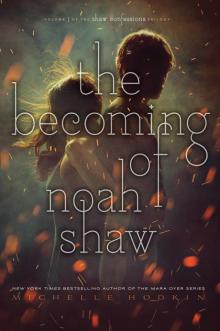 The Becoming of Noah Shaw
The Becoming of Noah Shaw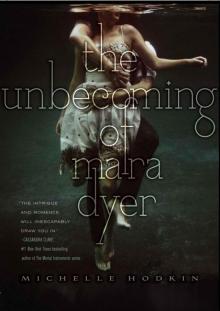 The Unbecoming of Mara Dyer
The Unbecoming of Mara Dyer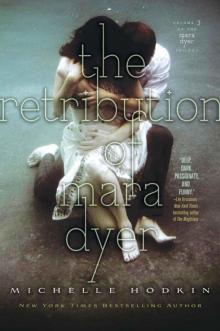 The Retribution of Mara Dyer
The Retribution of Mara Dyer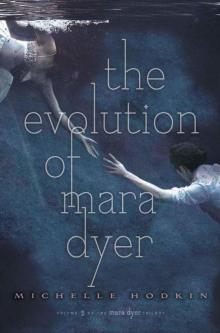 The Evolution of Mara Dyer
The Evolution of Mara Dyer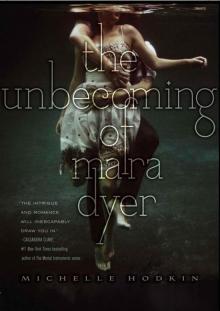 The Unbecoming of Mara Dyer md-1
The Unbecoming of Mara Dyer md-1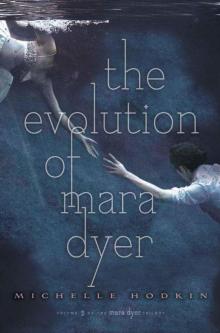 The Evolution of Mara Dyer md-2
The Evolution of Mara Dyer md-2 The Reckoning of Noah Shaw
The Reckoning of Noah Shaw